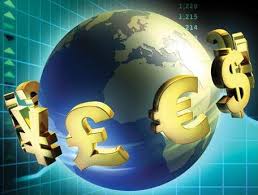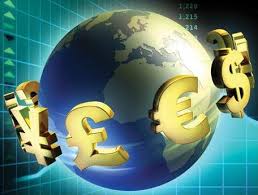
After rising at its most rapid pace in 2 1/2 years in the second quarter, the world economy looks well on its way to a year of faster, firmer growth.
As long-time laggards Japan and the euro area perk up, the expansion is broad based. And economists say that because the gains are not generating much in the way of inflation or other excesses that frequently presage a downturn, the gains look sustainable and are even more encouraging.
“The global economy is in better shape than it has been in several years,” said Torsten Slok, chief international economist at Deutsche Bank AG in New York. “We just don’t see what would be a trigger for a recession.”
With the economic recovery solid enough to generate higher corporate profits but not so fast as to lead to a rapid pickup in inflation and interest rates, he called it a “Goldilocks” scenario for stock market investors. In the past five quarters, in what is its longest stretch of gains since the 2007-08 financial crisis, the MSCI ACWI Index of stocks from emerging and advanced economies has risen steadily.
According to the median forecast of economists surveyed by Bloomberg, global gross domestic product is projected to increase by 33.5 percent in 2018 and 4 percent in 2017. While it would still represent a clear acceleration from last year’s 3.1 percent advance, that would be a come down from an estimated 4 percent plus pace in the second quarter.
“Recent data point to the broadest synchronized upswing the world economy has experienced in the last decade,” International Monetary Fund chief economist Maurice Obstfeld wrote in a recent blog post. “World trade growth has also picked up, with volumes projected to grow faster than global output in the next two years.”
Budding rebounds in Europe and Japan, two economies that until now had been seen as drags on the global economy has helped in the pick-up.
The euro-area economy is starting to build momentum after years of lackluster growth. The expansion is more evenly spread across the 19-nation region than in the past and it accelerated to 0.6 percent in the second quarter. While Italy, long an slouch in the region, may see the best performance since 2010 this year. the Netherlands posted the strongest data in a decade and Italy, long a slouch in the region.
Since European Central Bank President Mario Draghi wants to make sure the recovery is well established before reining in stimulus, that’s good news for him. There’s little sign of significant wage gains as yet and inflation is still undershooting the ECB’s goal. That’s allowing Draghi to take his time in scaling back support for the region’s economy.
Elevating hopes for a sustainable recovery in an economy that’s been better known in recent years for tepid inflation and a declining population than beating forecasts, the strongest domestic demand in years helped drive Japanese GDP to a sixth consecutive quarter of expansion.
“We have just begun to see more convincing evidence that domestic demand is finally picking up,” Kathy Matsui, chief Japan strategist at Goldman Sachs Group Inc., said on Bloomberg Television.
(Sourcec:www.bloomberg.com)
As long-time laggards Japan and the euro area perk up, the expansion is broad based. And economists say that because the gains are not generating much in the way of inflation or other excesses that frequently presage a downturn, the gains look sustainable and are even more encouraging.
“The global economy is in better shape than it has been in several years,” said Torsten Slok, chief international economist at Deutsche Bank AG in New York. “We just don’t see what would be a trigger for a recession.”
With the economic recovery solid enough to generate higher corporate profits but not so fast as to lead to a rapid pickup in inflation and interest rates, he called it a “Goldilocks” scenario for stock market investors. In the past five quarters, in what is its longest stretch of gains since the 2007-08 financial crisis, the MSCI ACWI Index of stocks from emerging and advanced economies has risen steadily.
According to the median forecast of economists surveyed by Bloomberg, global gross domestic product is projected to increase by 33.5 percent in 2018 and 4 percent in 2017. While it would still represent a clear acceleration from last year’s 3.1 percent advance, that would be a come down from an estimated 4 percent plus pace in the second quarter.
“Recent data point to the broadest synchronized upswing the world economy has experienced in the last decade,” International Monetary Fund chief economist Maurice Obstfeld wrote in a recent blog post. “World trade growth has also picked up, with volumes projected to grow faster than global output in the next two years.”
Budding rebounds in Europe and Japan, two economies that until now had been seen as drags on the global economy has helped in the pick-up.
The euro-area economy is starting to build momentum after years of lackluster growth. The expansion is more evenly spread across the 19-nation region than in the past and it accelerated to 0.6 percent in the second quarter. While Italy, long an slouch in the region, may see the best performance since 2010 this year. the Netherlands posted the strongest data in a decade and Italy, long a slouch in the region.
Since European Central Bank President Mario Draghi wants to make sure the recovery is well established before reining in stimulus, that’s good news for him. There’s little sign of significant wage gains as yet and inflation is still undershooting the ECB’s goal. That’s allowing Draghi to take his time in scaling back support for the region’s economy.
Elevating hopes for a sustainable recovery in an economy that’s been better known in recent years for tepid inflation and a declining population than beating forecasts, the strongest domestic demand in years helped drive Japanese GDP to a sixth consecutive quarter of expansion.
“We have just begun to see more convincing evidence that domestic demand is finally picking up,” Kathy Matsui, chief Japan strategist at Goldman Sachs Group Inc., said on Bloomberg Television.
(Sourcec:www.bloomberg.com)





